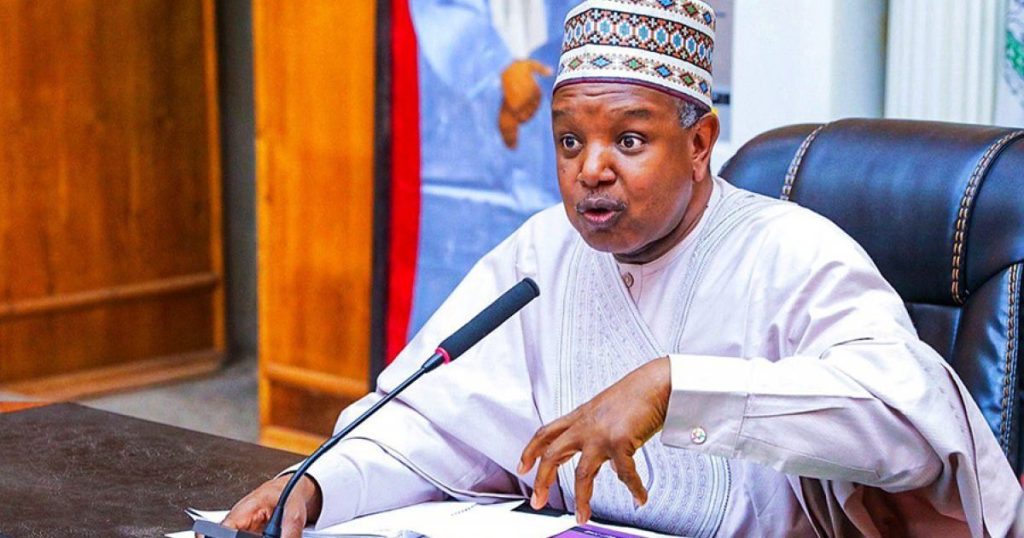Paragraph 1: A Resurgent Nigerian Economy Driven by Bold Reforms
Nigeria’s economic landscape is experiencing a significant transformation, marked by a resurgence in growth and stability. This positive trajectory is attributed to the government’s "Renewed Hope Agenda," a comprehensive set of reforms aimed at revitalizing the nation’s economy. Abubakar Bagudu, the Minister of Budget and Economic Planning, has affirmed that these bold measures, though challenging in the short term, are yielding tangible results and restoring investor confidence both domestically and internationally. The administration’s focus on credibility, transparency, and structural change has instilled confidence in the private sector, attracting both foreign and domestic investment. Key sectors such as agriculture, energy, and infrastructure are witnessing renewed interest and activity, contributing to the overall economic uplift.
Paragraph 2: Fuel Subsidy Removal and Exchange Rate Unification: Cornerstones of Fiscal Sanity
Two pivotal decisions have played a crucial role in stabilizing Nigeria’s fiscal landscape: the removal of fuel subsidies and the unification of the foreign exchange market. The fuel subsidy, which consumed a significant portion of the nation’s GDP, was identified as a major drain on resources, benefiting a select few while hindering overall economic progress. President Tinubu’s decisive action to eliminate this subsidy has been lauded as a courageous step towards fiscal responsibility. Simultaneously, the unification of the foreign exchange market has eliminated uncertainties and favoritism, creating a more transparent and efficient system. This move has not only generated increased revenue but also boosted private sector confidence by fostering a fair and predictable market environment.
Paragraph 3: Sustainable Fiscal Management: Balancing Budgetary Responsibility and Strategic Investment
The 2024 and 2025 budgets reflect the government’s commitment to balancing fiscal responsibility with strategic investments in critical sectors. A significant deficit reduction achieved in the 2024 budget signals a commitment to sound fiscal management, further enhancing market confidence. This balanced approach ensures that while fiscal prudence is prioritized, crucial investments in health, education, infrastructure, security, and technology are not neglected. This strategy aims to address immediate needs while fostering long-term growth and development.
Paragraph 4: Debt Management and Central Bank Independence: Building Credibility and Trust
President Tinubu’s commitment to respecting the independence of the Central Bank of Nigeria (CBN) has been instrumental in managing the nation’s debt burden, particularly the N22.7 trillion Ways and Means financing. This demonstration of fiscal discipline has enhanced Nigeria’s credibility on the global stage, reinforcing investor trust and paving the way for sustainable economic growth. This disciplined approach to debt management demonstrates a commitment to long-term financial stability.
Paragraph 5: Collaborative Governance: Fostering Coordination and Driving Results
The success of Nigeria’s economic turnaround is attributed to the collaborative efforts of the Presidential Economic Coordination Council and the Economic Management Team, led by President Tinubu and Coordinating Minister for the Economy, Wale Edun. This coordinated approach ensures that policies are coherent, results-driven, and aligned with national priorities. The involvement of the private sector in this reform effort reinforces the commitment to fostering a collaborative environment where all stakeholders work together to achieve shared economic goals. This collaborative approach fosters synergy and ensures that policies are effectively implemented.
Paragraph 6: A Vision for Future Prosperity: Enduring Short-Term Challenges for Long-Term Gains
While acknowledging the short-term challenges associated with these reforms, Minister Bagudu emphasized their long-term benefits, comparing the process to a necessary fitness regimen. The analogy of an "economic workout" underscores the idea that while the initial stages of reform may be strenuous, they are essential for building a stronger and more resilient economy. President Tinubu’s commitment to enduring these short-term difficulties underscores his dedication to securing a prosperous future for generations to come. This long-term vision emphasizes that the current reforms are not just about immediate economic recovery but about building a robust and sustainable foundation for future prosperity.














